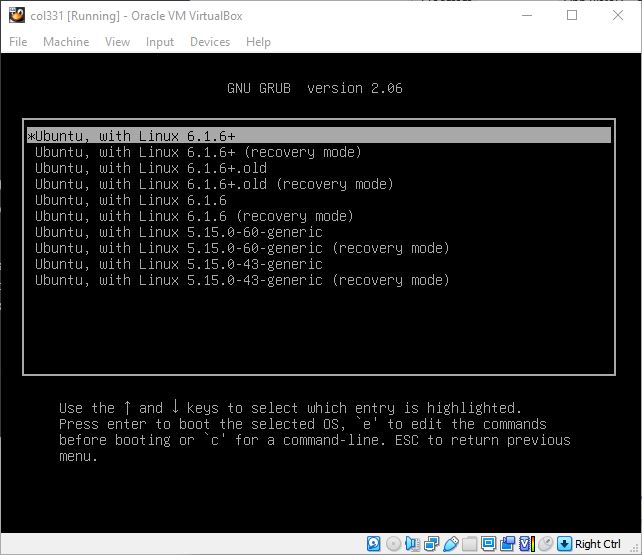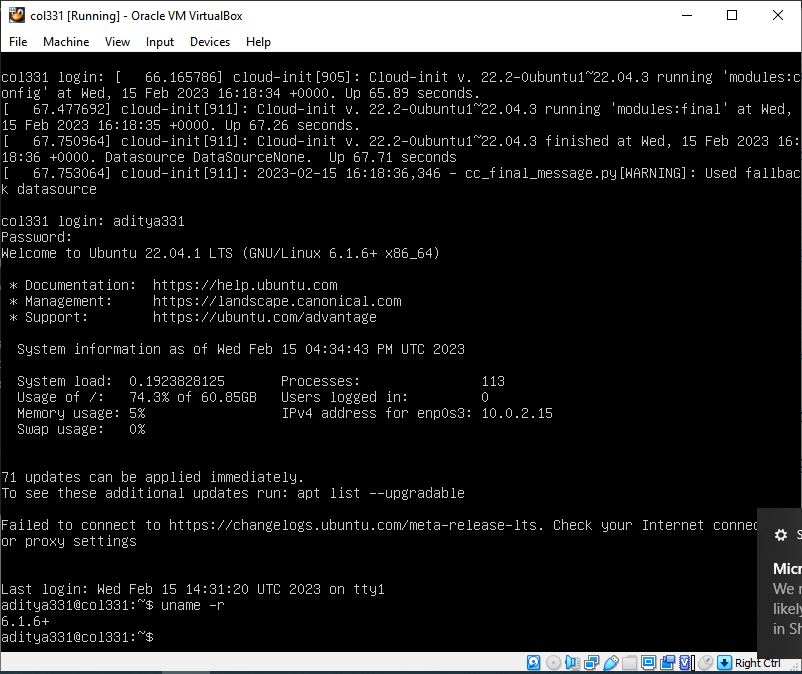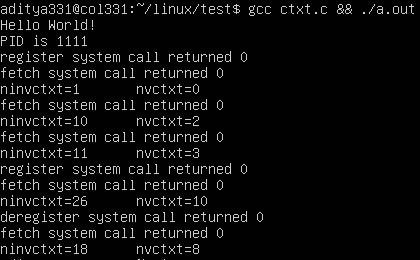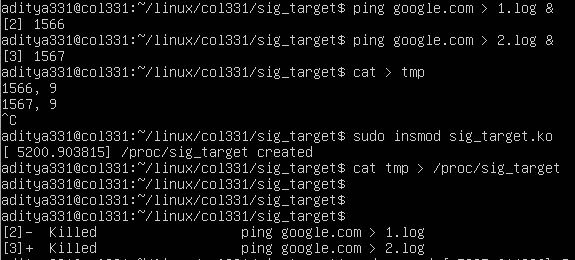Assignment 1 of Prof. Smruti R. Sarangi's COL331 course on Operating Systems in 2023.
Modifying the Linux kernel (v6.1.6) to add a system call for track context switches and a kernel module to generate signals to any process.
I usually use an M1 MacBook Air for my work, but I realised there would be many complications on it so I switched to my old Windows laptop for this assignment, it runs an i3-5005U with 8GB RAM.
Rather than using the virt-manager of Ubuntu, I decided to use
Oracle VM VirtualBox as I’m more comfortable with it and it runs on
Windows easily. On the VM, I installed
ubuntu-22.04.1-live-server-amd64.iso with the default options.
For the storage, I had to extend the default partition using resize2fs
and lvextend commands.
Earlier I had avoided cloning the repo and downloaded the tar of the
v6.1.6 directly. However, later I decided to maintain the source on my
private repo GitHub, as it would be easier to maintain and also easier
to generate the patch, and also reserve the original commits on the
source tree.
It was not possible to fork torvalds/linux as it would not be a
private repo, so I decided to first clone the original repo (tag v6.1.6)
from git.kernel.org link and then push it to my GitHub using ssh key.
However, the pack size was almost around 4GB so I had to use
git gc –aggressive to bring it down to around 1.8GB as the upper limit
by GitHub is 2GB.
By such an arrangement, now I can code on my MacBook and then push to GitHub then pull on the VM to run and also push back any changes from the VM. I also have the flexibility of switching to some other VM in future.
In the .config file, I also had to blank out the
CONFIG_SYSTEM_REVOCATION_KEYS entry apart from the given
CONFIG_SYSTEM_TRUSTED_KEYS entry in the instructions. In the options
after running make for the first time (or make menuconfig I pressed
ENTER all through to use the default options.
On running make -j4 then sudo make modules_install -j4 then
sudo make install -j4 and sudo update-grub the kernel was
successfully installed.
The make step took a very long time (around 10-12 hours) as the
machine I was using had only 2 cores and no SSD.
The key observation was that in the task_struct there were fields for
nvcsw and nivcsw which automatically stored the context switch
counts for that pid, we now just had to sum over the individual PID
which are stored in the linked list. We can get the task_struct using
find_task_by_vpid function, where the vpid ensures that the task does
not refer a pid beyond its namespace.
For learning how to create a signal call, I first practiced by creating
a program add.c for just adding 2 numbers. I made a folder col331/
in the directory, added a Makefile with obj-y := add.o to tell it to
compile that file and in the main Makefile I put core-y := col331/ to
tell it to include that folder while compiling the main kernel.
To register the system call, I used SYSCALL_DEFINEn syntax (which
expands to asmlinkage in the macros). Then added a prototype in
include/linux/syscalls.h, defined its syscall number in
include/uapi/asm-generic/unistd.h and added it to the syscall table at
arch/x86/entry/syscalls/syscall_64.tbl
Finally I created a test file in test/add.c which used syscall()
function to see if the system call is working fine. For logging I had
used KERN_ALERT so the message would display in the console (which had
the default log level set to 4).
Once I got this working, similarly I defined functions for register, fetch, deregister and declared their syscalls as 452, 453 and 454 respectively.
I studied the list mechanism from the book "Linux Kernel Development" by
Robert Love. So first we define the structure for pid_node as given in
the assignment, and then we declare the head of the list using
LIST_HEAD(pid_head); macro
In the register function, we first create a pid node using kmalloc
(instead of malloc as we need to allocate in kernel space). Then we use
INIT_LIST_HEAD macro to initialise the list head field, and then add
it to the end of the linked list using list_add_tail function
In the fetch function, we first set the counts in the struct to 0, and
then we traverse the list using list_for_each_entry function and sum
up the context switch counts.
In the deregister function, we have to use list_for_each_entry_safe
instead as it is safe against deletion of elements in between (although
we need to delete only once so this should not be much of an issue)
We also use find_task_by_vpid function to check if the pid is valid or
not.
In the implementation, to avoid messing up the syntax with the
SYSCALL_DEFINE macros, I first defined the functions in the regular
way but with __ prefix then called them inside the function defined
with SYSCALL_DEFINE like a wrapper.
For the testing, I created a dummy function foo() which runs a loop
for 108 times then sleeps for 1 second, so we have both
involuntary and voluntary context switches for that process.
For creating a module, first I created a directory col331/sig_target,
initialised sig_target.c. We need int init_module() and
void cleanup_module() functions to define the insertion and removal of
the module in the kernel. They can be renamed but I followed the
convention.
In the Makefile I added obj-m += sig_target.o to tell it to compile
and all: make -C /lib/modules/$(shell uname -r)/build M=$(PWD) modules
for adding the module.
The module is compiled with make, then we use
sudo insmod sig_target.ko to insert the module into the kernel and
sudo rmmod sig_target to remove it.
The proc filesystem allows us to take input and output from the user
space. The "file" is stored in kernel space memory as a 1024 character
array procfs_buffer[PROCFS_MAX_SIZE].
It can be written to and read by the user by using the
/proc/sig_target "file", so we use 0666 permission (altho it was not
necessary for the user to read the file technically as per the
assignment task, but it was needed for convenience)
We declare a proc_dir_entry which is initialised along with the
module. When the user reads the file, proc_read is invoked (which
basically copies from the kernel space buffer to the user space buffer),
and when they write to it, proc_write is invoked (which basically
copies from the user space buffer to the kernel space buffer). A pointer
is maintained to keep the offset till where the buffer has been written
to or read.
This proc file is deleted when the module is cleaned up.
For testing, we should create a tmp file for ease of editing, then use
command cat tmp > /proc/sig_target to write to the file, and
cat /proc/sig_target to read it.
We need to check the proc file every second, so I used the
workqueue mechanism. I assumed
When the module is initialised, we first allocate a work queue and
initialise the work with INIT_DELAYED_WORK macro. Then we call
schedule_delayed_work in a recursive fashion
In the worker function, we basically read line by line using strchr
from linux/string.h then extract the pid and signal using sscanf
function
We get the pointer to the pid struct using find_vpid function, it is
0 if the pid in proc file is invalid. If it is valid we fetch the
task_struct using pid_task function. Finally, we send the signal to
that task using send_sig_info function, keeping our access as kernel
in the info.
While testing, we can try sending signal 9 (SIGKILL) to processes and see if they’re killed.
The source files have been formatted with clang-format. The diff was
generated using
sudo diff -rupN linux-base/ linux-change/ > ctxttrack.patch instead of
sudo diff -rupN linux-change/ linux-base/ > ctxttrack.patch. I have
also supplied a git patch generated with
git diff 38f3ee1 HEAD > ctxttrack.git.patch
#include <linux/types.h>
#include <linux/list.h>
struct pid_node {
pid_t pid; /* process id */
struct list_head
next_prev_list; /* contains pointers to previous and next elements */
};
struct pid_ctxt_switch {
unsigned long ninvctxt; /* Count of involuntary context switches */
unsigned long nvctxt; /* Count of voluntary context switches*/
};#include "ctxt_switch.h"
#include <linux/sched.h>
#include <linux/kernel.h>
#include <linux/syscalls.h>
LIST_HEAD(pid_head);
long __register(pid_t pid)
{
struct task_struct *t;
struct pid_node *temp_node;
if (pid < 1) {
return -22;
}
t = find_task_by_vpid(pid);
if (!t) {
return -3;
}
temp_node = kmalloc(sizeof(struct pid_node), GFP_KERNEL);
temp_node->pid = pid;
INIT_LIST_HEAD(&temp_node->next_prev_list);
list_add_tail(&temp_node->next_prev_list, &pid_head);
return 0;
}
long __fetch(struct pid_ctxt_switch *stats)
{
struct pid_node *cursor;
struct task_struct *t;
stats->ninvctxt = 0;
stats->nvctxt = 0;
list_for_each_entry(cursor, &pid_head, next_prev_list) {
t = find_task_by_vpid(cursor->pid);
if (!t) {
list_del(&cursor->next_prev_list);
kfree(cursor);
return -22;
}
stats->ninvctxt += t->nivcsw;
stats->nvctxt += t->nvcsw;
}
return 0;
}
long __deregister(pid_t pid)
{
struct pid_node *cursor, *temp;
if (pid < 1) {
return -22;
}
list_for_each_entry_safe(cursor, temp, &pid_head, next_prev_list) {
if (cursor->pid == pid) {
list_del(&cursor->next_prev_list);
kfree(cursor);
return 0;
}
}
return -3;
}
SYSCALL_DEFINE1(register, pid_t, pid)
{
return __register(pid);
}
SYSCALL_DEFINE1(fetch, struct pid_ctxt_switch *, stats)
{
return __fetch(stats);
}
SYSCALL_DEFINE1(deregister, pid_t, pid)
{
return __deregister(pid);
}#include <linux/kernel.h>
#include <linux/module.h>
#include <linux/proc_fs.h>
#include <linux/workqueue.h>
#include <linux/sched.h>
#include <linux/uaccess.h>
#include <linux/interrupt.h>
#include <linux/string.h>
#include <linux/sched/signal.h>
#include <linux/sched.h>
#include <linux/delay.h>
#include <linux/pid.h>
#define AUTHOR "Aditya Singh <ee1200461@iitd.ac.in>"
#define PROCFS_MAX_SIZE 1024
#define PROCFS_NAME "sig_target"
#define PERMS 0666
#define WORK_QUEUE_NAME "WQsig_target.c"
#define WQ_TIMER_DELAY 1000 /* 1000 jiffy = 1s */
MODULE_LICENSE("GPL");
MODULE_AUTHOR(AUTHOR);
static int timer_interrupt_count = 0;
static struct workqueue_struct *my_workqueue = NULL;
static struct delayed_work work;
static struct proc_dir_entry *Sig_Target;
static char procfs_buffer[PROCFS_MAX_SIZE];
static unsigned long procfs_buffer_size = 0;
static void work_handler(struct work_struct *_work)
{
struct kernel_siginfo info;
struct task_struct *task;
char *ptr = procfs_buffer;
int p, s, ret;
pid_t pid;
struct pid *v;
timer_interrupt_count++;
printk(KERN_INFO "routine %d\n %s", timer_interrupt_count,
procfs_buffer);
memset(&info, 1, sizeof(info));
while (ptr && procfs_buffer_size) {
sscanf(ptr, "%d, %d", &p, &s);
pid = p;
printk(KERN_INFO "sending signal %d to process %d", s, p);
v = find_vpid(pid);
if (v == 0) {
printk(KERN_ALERT "Invalid PID %d", v);
} else {
printk(KERN_INFO "virtual pid %d", v);
task = pid_task(v, PIDTYPE_PID);
ret = send_sig_info(s, &info, task);
printk(KERN_INFO
"sent signal %d to process %d and returned %d",
s, p, ret);
}
ptr++;
ptr = strchr(ptr, '\n');
}
schedule_delayed_work(&work, WQ_TIMER_DELAY);
}
static ssize_t procfile_read(struct file *file, char __user *buffer,
size_t count, loff_t *ppos)
{
int ret, c;
printk(KERN_INFO "procfile_read (/proc/%s) called\n", PROCFS_NAME);
if (*ppos > 0) {
ret = 0;
} else {
c = copy_to_user(buffer, procfs_buffer, procfs_buffer_size);
ret = procfs_buffer_size;
}
*ppos = procfs_buffer_size;
return ret;
}
static ssize_t procfile_write(struct file *file, const char __user *buffer,
size_t count, loff_t *ppos)
{
printk(KERN_INFO "procfile_write (/proc/%s) called with count %d\n",
PROCFS_NAME, count);
procfs_buffer_size = count;
if (*ppos > 0) {
return -EFAULT;
}
if (procfs_buffer_size > PROCFS_MAX_SIZE - 1) {
procfs_buffer_size = PROCFS_MAX_SIZE - 1;
}
if (copy_from_user(procfs_buffer, buffer, procfs_buffer_size)) {
return -EFAULT;
}
procfs_buffer[procfs_buffer_size] = '\0';
*ppos = strlen(procfs_buffer);
return procfs_buffer_size;
}
static struct proc_ops ops = {
.proc_read = procfile_read,
.proc_write = procfile_write,
};
int init_module()
{
Sig_Target = proc_create(PROCFS_NAME, PERMS, NULL, &ops);
if (Sig_Target == NULL) {
printk(KERN_ALERT "Error: Could not initialize /proc/%s\n",
PROCFS_NAME);
return -ENOMEM;
}
printk(KERN_ALERT "/proc/%s created\n", PROCFS_NAME);
my_workqueue = alloc_workqueue(WORK_QUEUE_NAME, WQ_UNBOUND, 1);
INIT_DELAYED_WORK(&work, work_handler);
schedule_delayed_work(&work, WQ_TIMER_DELAY);
return 0;
}
void cleanup_module()
{
cancel_delayed_work_sync(&work);
proc_remove(Sig_Target);
printk(KERN_ALERT "/proc/%s removed\n", PROCFS_NAME);
}


